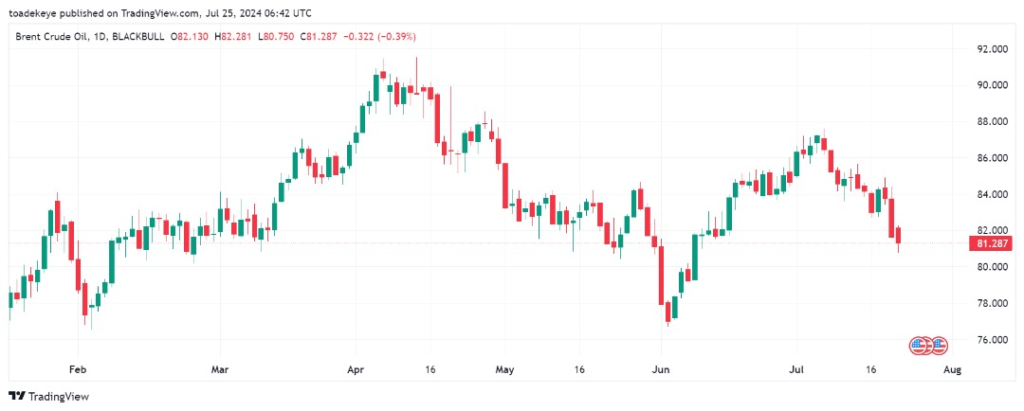
By Taiwo Adekeye, FMVA
Research Analyst
Oil prices closed higher on Wednesday, driven by large declines in U.S. crude and fuel stocks. However, prices were hovering close to their lowest level in six weeks as a result of concerns over weak global demand.U.S. crude inventories fell by 3.7 million barrels last week, while U.S. gasoline stocks dropped by 5.6 million barrels. Brent crude futures for September closed 0.9%, higher at $81.71 a barrel while U.S. West Texas Intermediate crude for September surged by 0.8%, to close at $77.59 per barrel.
Collapse Of Big Techs Trigger Market Turmoil, As Nasdaq Sheds 3.6%
The blue-chip S&P 500 fell 2.3 %, its worst day since December 2022, while the tech-heavy Nasdaq Composite fell 3.6 %, its worst day since October 2022. The losses in both were driven by big tech stocks, including Nvidia, Microsoft, Apple and Tesla. Tesla fell 12.3%, its worst daily performance since 2020, Alphabet fell 5%, its worst day since January. Chipmaker Nvidia was the biggest drag on the S&P 500, down 6% on Wednesday, while Super Micro Computer and ASML Holdings, semiconductor stocks, were the biggest decliners in the Nasdaq. In addition, Meta slumpped by 5.6%, Microsoft by 3.6% and Apple fell 2.9%.Earnings result of Big Tech companies like Meta, Amazon and Apple would be hitting the market as from next week.
Bank Of Canada Cuts Rates By 25bps
The Bank of Canada on Wednesday took a dovish stance by cutting its key interest rate by 25 basis points for the second consecutive month, bringing it to 4.5%. The North American economy had kept its policy rate at a two-decade high of 5% for almost a year in a bid to combat high surging inflation. However, the Canadian dollar further declined after the rate cut announcement, down by 0.06% to close at 1.3794 to the USD. Inflation in Canada is facing two opposing forces , a weak economy pulling it down and persistently high prices of shelter and services keeping it up.
Business Growth Activities Accelerate In India
India’s business activity accelerated at its fastest pace in three months in July, driven by strong demand in the services sector. The sector has been hiring at a faster pace, hitting 18 years high. India composite purchasing managers’ index compiled by S&P Global, surged to 61.4 this month from June’s final reading of 60.9, marking three years of expansion. However, the 50-level separates growth from contraction. Overall expansion was led by the dominant services industry, whose PMI rose to a four-month high of 61.1 this month from 60.5 in June while gowth in manufacturing was also robust, and the factory PMI increased to 58.5 from 58.3 – its highest since April.
Japan’s Core Inflation Leaps To 2.6%
Japan’s core inflation accelerated for a second straight month in June, extending a more than two-year run above the central bank’s 2% target and dampening the expectations of a near-term interest rate reduction. The core consumer price index (CPI), which strips away the effect of volatile fresh food prices, rose by 2.6% in June from the previous year. However, a separate index that excludes the effects of fresh food and fuel costs, closely watched by the BOJ as a broader price trend indicator, rose 2.2% in June after a 2.1% reading in May. Conclusively, Service inflation increased to 1.7% in June from 1.6% in May, an indication that companies continued to pass on rising labour costs through price hikes.















